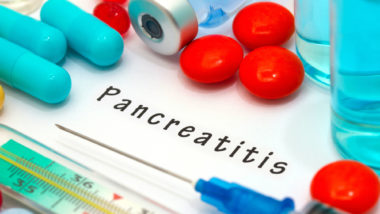 A flesh-eating bacterial infection of the genital region known as Fournier’s gangrene requires immediate necrotizing fasciitis treatment to control the spread of the disease.
A flesh-eating bacterial infection of the genital region known as Fournier’s gangrene requires immediate necrotizing fasciitis treatment to control the spread of the disease.
This necrotizing fasciitis treatment at the very least involves the patient being put on very powerful antibiotics and often includes surgical removal of infected and delicate perineal tissues.
Fournier’s gangrene is extremely rare but has recently been connected by the U.S. Food and Drug Administration (FDA) with use of sodium-glucose cotransporter 2 (SGLT2) inhibitor medications used in the treatment of type-2 diabetes.
The FDA has added a new warning regarding the flesh-eating bacteria on patient medication guides and prescription information for all drugs in this class including:
- Canagliflozin (Invokana, Invokamet, Invokamet XR)
- Dapagliflozin (Farxiga, Xigduo XR, Qtern)
- Empagliflozin (Jardiance, Glyxambi, Synjardy, Synjardy XR)
- Ertugliflozin (Steglatro, Segluromet, Steglujan)
While there have only been 12 cases of Fournier’s Gangrene among diabetes patients reported to the drug oversight agency in the five year period between March 2013 and May 2015, all of the involved patients were taking an SGLT2 inhibitor.
Previously, the flesh-eating bacterial infection had not been reported in the female population, but among the dozen reported during this time, five of them were women and the rest were men.
As a point of reference, this subcutaneous and life-threatening infection of the genital region was known to occur with men above 50 years of age at a rate of 1.6 out of 100,000.
Among the patients reported that had undergone necrotizing fasciitis treatment while taking SGLT2 inhibitors for type-2 diabetes, there was at least one person as young as 38.
Also, among the dozen cases, most of them had been on the diabetic treatment for the better part of a year prior to onset. Necrotizing fasciitis treatment after the condition developed required the majority to eliminate the SGLT2 inhibitor regimen.
The truly alarming part about these 12 patients was that all of them had to have necrotizing fasciitis treatment that involved hospitalization and at least one surgery. Several of them required more than one tissue-removal intervention under anesthesia.
Complications from the necrotizing fasciitis treatment included diabetic ketoacidosis, sepsis, and kidney injury. These complications meant that a few of them had to be sent to rehabilitation facilities prior to full home discharge. One of that dozen succumbed to the infectious disease.
The Popularity of SGLT2 Inhibitors
Last year alone, it was estimated that 1.7 million people were recipients of SGLT2 inhibitor prescriptions for type-2 diabetes. These drugs are extremely popular among physicians treating high-blood glucose problems in that they are overall quite effective.
They operate on the level of the kidneys by preventing these organs from reabsorbing excess glucose back into the bloodstream. The body then eliminates the sugars not needed through its urine output—maintaining a delicate blood level balance.
The fact that the urine has higher sugar content than average is one of the reasons necrotizing bacteria might be attracted to the genital region. Patients should act quickly to seek medical care if they experience any unusual reddening of the region or an inflammatory response.
Join a Free Diabetes Medications & Flesh-Eating Infection Lawsuit Investigation
The type-2 diabetes medications linked to the flesh-eating infection include:
- Invokana
- Invokamet/Invokamet XR
- Farxiga
- Xigduo XR
- Qtern
- Jardiance
- Glyxambi
- Synjardy/Synjardy XR
- Steglato
- Segluromet
- Steglujan
If you or a loved one took one of the type-2 diabetes medications listed above and suffered from a flesh-eating genital infection, you may qualify to join this diabetes medication lawsuit investigation. Fill out the FREE form on this page for more information.
ATTORNEY ADVERTISING
Top Class Actions is a Proud Member of the American Bar Association
LEGAL INFORMATION IS NOT LEGAL ADVICE
Top Class Actions Legal Statement
©2008 – 2025 Top Class Actions® LLC
Various Trademarks held by their respective owners
This website is not intended for viewing or usage by European Union citizens.
Get Help – It’s Free
Join a Free Diabetes Medications & Flesh-Eating Infection Lawsuit Investigation
If you qualify, an attorney will contact you to discuss the details of your potential case at no charge to you.
PLEASE NOTE: If you want to participate in this investigation, it is imperative that you reply to the law firm if they call or email you. Failing to do so may result in you not getting signed up as a client or getting you dropped as a client.
E-mail any problems with this form to:
[email protected].
Oops! We could not locate your form.












